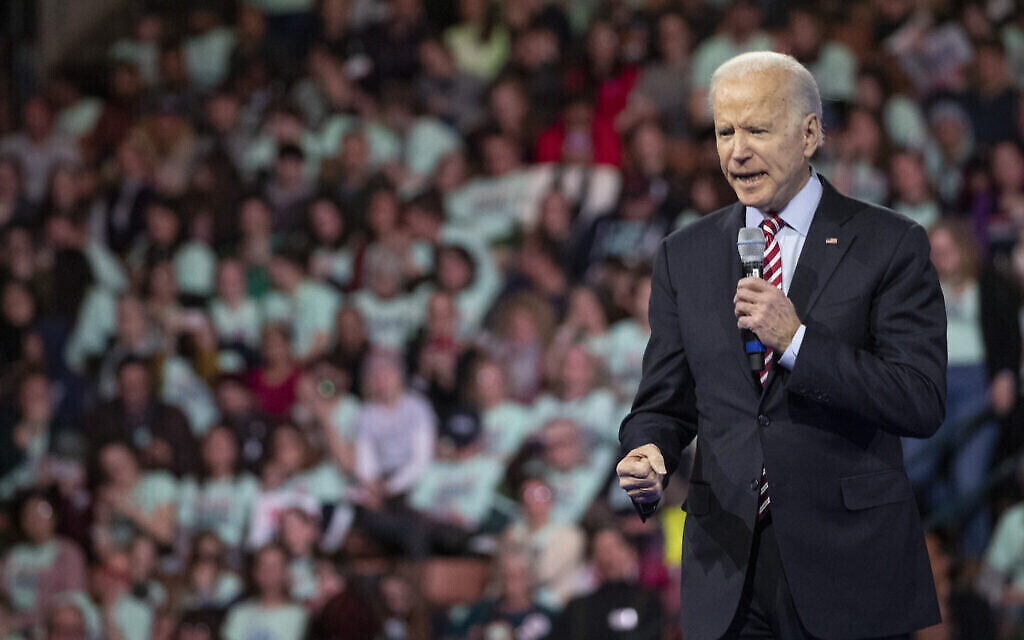As Possibility of West Bank Annexation Looms, Democrats Mull How to Sway Israel
While party is unified in opposition to Israel extending sovereignty to settlements and Jordan Valley, it’s splintered over how harsh the response should be if Netanyahu goes ahead

After Israel swears in its new government Sunday, it is all but certain to face more international controversy over Prime Minister Benjamin Netanyahu’s proposed unilateral annexation of parts of the West Bank.
The move, if enacted, would amount to a major turning point in the Israeli-Palestinian conflict, with Israel crossing what has long been considered a red line not only by Palestinians but also foreign heads of state, American policy makers and Middle East peace negotiators, who argue that it would severely weaken the prospects for a two-state solution.
“There’s certainly some difference in terms of consequences,” a veteran strategist for the party told The Times of Israel. “The vast majority of Democrats don’t share this view, but some think security assistance ought to be curtailed or reduced or redirected [if Israel annexes parts of the West Bank], but that is a very small minority of Democrats.”
Get The AJT Newsletter by email and never miss our top stories Free Sign Up
Two national security officials in the Obama administration, Rob Malley and Phil Gordon, penned an op-ed in Foreign Policy last month urging the Democrats’ presumptive presidential nominee Joe Biden to make clear that, if Israel moved forward with annexation, portions of American aid would be at risk.
“Even as the United States continues to support Israel’s security, a President Biden could explore ways of deducting any money spent on the annexed territories from generous US assistance, consistent with the long-standing US policy of deducting spending on Israeli settlements in the West Bank from US loan guarantees,” they wrote. “If such a policy were made clear, any decision by Israel’s government to nonetheless go forward with annexation would be a sign that it felt secure enough to forgo a portion of US assistance.”
Other Democrats, however, have said that US aid to Israel shouldn’t be touched and that there would be other levers to sway Jerusalem, including by not shielding it from censure over the matter at international fora such as the United Nations.
Responding to Democratic rumblings of discontent, the American Israel Public Affairs Committee released a statement this week that sought to convince lawmakers not to push for any changes to US-Israel policy as a reaction to annexation.
“Some have proposed reducing our ties with Israel because they object to the potential decision by Israel’s leaders to extend Israeli sovereignty to parts of the West Bank,” the statement said. “Doing anything to weaken this vital relationship would be a mistake.”

Until then, the government’s focus is supposed to be exclusively on responding to the COVID-19 pandemic, but that still leaves plenty of time for the government to annex disputed West Bank territory before November’s US election.
While the move would be in accordance with the Middle East plan US President Donald Trump unveiled in January which endorsed extending Israeli sovereignty over roughly 30 percent of the West Bank, it would fuel tensions with the Democratic party, former Democratic officials and progressive Israel activists say.
“I think there is a consensus among Democrats that unilateral annexation is a bad idea and they oppose it,” Obama administration envoy to Israel Dan Shapiro told The Times of Israel. “Israel, if it decides to undertake this, would be doing it with the knowledge that one entire political party, including its closest friends and strongest supporters in that party, view this as a very negative development and very harmful to the US-Israel relationship. So that would be unfortunate.”
Democrats have been on record making that point for months now. In December, the House passed a resolution opposing annexation, down party lines, with overwhelming support from Democrats, including staunch supporters of Israel, like New York Rep. Eliot Engel, Florida Rep. Nita Lowey and Illinois Rep. Brad Schneider.
The Trump administration, however, has sent other signals. Last month, the State Department said it was ready to recognize Israel’s annexation of parts of the West Bank, and Secretary Mike Pompeo, on a flying visit to Israel Wednesday, said Jerusalem has the “right and obligation” to decide what and when to annex.
The debate over how Democrats should respond to the looming Israeli decision heated up on Capitol Hill after three Democratic senators crafted a letter to Netanyahu this week saying the action would “erode strong support among the American people for the special relationship.”
The letter, orchestrated by Maryland Senator Chris Van Hollen, Virginia Senator Tim Kaine and Connecticut Senator Chris Murphy, is supported by the liberal Mideast advocacy group J Street but opposed by the Democratic Majority for Israel, which sent an email to its followers this week asking them to urge their senators not to sign it.

“Our reading of the letter was that it would be interpreted as a call to condition US security aid,” said Mark Mellman, president of the pro-Israel Democratic group. “The authors suggested that’s not the case, that that’s not what they believe. But we read it that way and think that people ought to not sign it until it’s changed to clearly reflect what the authors report to be its intent.”
“It’s one thing to strongly object to annexation, it’s another thing to threaten a mutually beneficial relationship,” Mellman told The Times of Israel. “That’s an important line that I think members of Congress ought not to cross.”
The letter itself does not mention US aid to Israel. J Street President Jeremy Ben-Ami said his organization does not support cutting aid over annexation but stressed a number of other potential responses, including implementing stricter restrictions and reporting requirements to ensure American taxpayer money does not go toward annexation and not protecting Israel at the UN.

“It’s is not a single yes-or-no question,” Ben-Ami told The Times of Israel. “Slashing aid is a very, very strong term and implies you’re taking a very blunt instrument and just hacking away. I think the tool kit for American foreign policy is a lot more robust than a slasher. You’ve got many, many things that could be done.”
“Far greater oversight and limitations on how money could be used would be certainly called for and I think widely within the range of discussion,” he added.
“Whether it’s at the security council or in other venues, the US might not provide blanket immunity and blanket support when it comes to issues related to this step. That is a limited surgical approach, not a blanket step back from America’s support for Israel,” Ben-Ami said. “But the US might not want to be in the position of defending and supporting actions that Israel has taken that clearly run counter to international law, America’s interests and Israel’s own interests.”
Other leading Democrats have in the past suggested the same approach. New York Congresswoman Alexandria Ocasio-Cortez said in April 2019 that cutting aid should be “on the table” following Netanyahu’s previous election victory; he had vowed on the campaign trail to annex the West Bank but was ultimately unable to form a coalition, forcing another round of elections.
Biden himself has called the idea “outrageous” and said he wouldn’t touch the aid, although he has spoken out multiple times against annexation, including at this year’s AIPAC conference, telling the attendees that it would “choke off any hope for peace.”

Shapiro, who worked alongside Biden in the Obama administration, also said there were other levers to influence Israel’s decisions beyond cutting aid. The vast majority of Democrats and security officials, he added, wouldn’t support changes to US assistance because of America’s own benefit from it through intelligence sharing and other forms of cooperation.
“The aid is not provided as altruism,” he said. “It is connected as a sense of obligation to help Israel with its security and survival, but it’s very much seen by American policy makers and national security officials as in the US interest. That was president Obama’s view.”
Last week, more than 30 former foreign policy officials, many of whom worked in the Obama administration, urged the Democratic National Committee to include language in the 2020 party platform that would oppose Israel’s planned annexation of West Bank territory and call for a greater commitment to Palestinian human rights.
As Israel moves closer to July 1, Democratic pro-Israel activists are expected to continue warning Israel that annexation would harm its relationship with one of the two major American political parties.
“It’s really important for Democrats to stress their unified stance in opposition to annexation,” said Susie Gelman, board chair of the Israel Policy Forum, a nonprofit that supports a two-state solution. “Because any form of annexation done unilaterally by Israel would erode the sense of shared democratic values between the US and Israel and further strain positive feelings about Israel in the Democratic party.”





comments